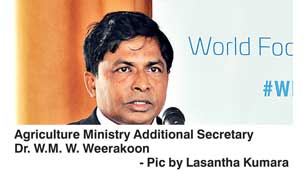Thursday Feb 19, 2026
Thursday Feb 19, 2026
Thursday, 19 October 2017 10:16 - - {{hitsCtrl.values.hits}}
By Charumini de Silva
Improving the cultivation culture in the country, connecting farmers to value chains and retaining rural youth to rejuvenate the village economy will be game changers for the sustainable development of Sri Lanka, a top official opined.
The inability to rise above the poverty line and the despair to achieve a decent living in the rural economy have become major challenges that need the immediate focus of the Government to balance out the unprecedented migration within the country, Agriculture Ministry Additional Secretary W.M.W. Weerakoon said at an event to mark World Food Day in Colombo this week.
Noting that Sri Lanka’s per capita poverty line was about Rs. 2,800 a month, he said on average there are 4.3 heads per family that need to at least earn Rs. 17,760 per month to go above the poverty line. However, the majority of farmers in the country today live below the poverty line due to a lack of finances and capacity and climate change challenges.
“A farmer has to cultivate at least 2.6 acres of rice to beat the poverty line for his family. For a maize cultivator, he needs about 3.6 acres just to go beyond the poverty line. Unfortunately, those farmers who grow on less than 2 acres of land are facing major livelihood challenges. As a result, the rural youth is migrating to cities, while the elderly go on with their farming,” he stressed.
It was noted that the recent changes in climate patterns have also severely affected the economy, where the Government is now compelled to import essential food crops. “Sri Lanka requires 2.8 million metric tonnes of rice per year, but we only have 1.5 million metric tonnes, which is sufficient only for eight months. In this scenario, we have to import all essential food items.”
Increasing productivity, making the farmer a key player in the value chains, introducing machinery cultivation and other activities to uplift the youth were outlined as significant initiatives to uplift the livelihoods of the farming community.
“In Sri Lanka farmers just sell the primary production without any value addition, value chains. At the national level, we now need to focus not only on increasing production but also ensuring that farmers are on the correct path of the value chain. Thereby, we can pass on the benefits of the agriculture revolution to the rural youth to remain in the sector,” he emphasised.
Highlighting the recently launched National Food Drive initiative of President Maithripala Sirisena, he said they aimed to cultivate rice on 800,000 hectares during this Maha season, while also converting 130,000 acres of uncultivated land for rice and other crops. The Government will provide a 50% subsidy for seed paddy for farmers affected by droughts to recommence their farming.
In addition, initiatives to popularise home gardening have commenced, where 500,000 women organisations and schoolchildren are encouraged to make use of the land for cultivation.
Weerakoon called for the support of all stakeholders, including international institutions, to make Sri Lanka’s National Food Drive, which will continue till 2020, a success and bring back past glory to the country.